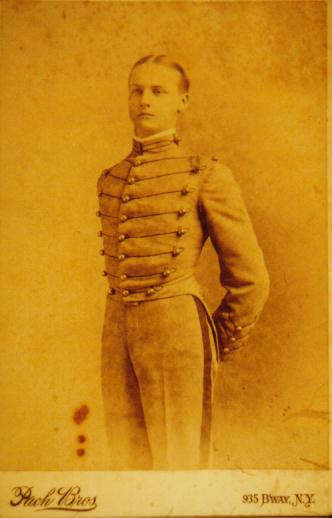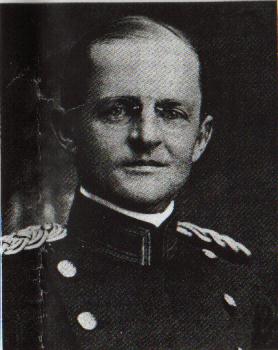Courtesy of the Wheeler Plantation:
Joseph Wheeler, Jr. was the eldest son of Joseph and Daniella Wheeler. Like his other siblings, his life was framed by life in rural Northern Alabama on the one hand, and facets of life associated with Joseph Wheeler’s congressional career in Washington, D.C. on the other. Owing in part to his father’s valuable service in both civic and military matters, Joe’s path toward a military career was perhaps to be expected.
The following excerpts have been taken from a biographical compilation, this written following Joe’s death in 1938, and provided by the Alabama Historical Commission from records at the Wheeler Home at Pond Spring. The author of the work has only been identified through the initials “H.A.W;” however, the following excerpts were taken from an extract from the “Seventieth Annual Report of the Association of Graduates of the United States Militry Academy, West Point, N.Y., June 10, 1939.”

Little is mentioned in this work regarding Joe’s early life; however, of his early college career, the following was written:
“A year at the University of Virginia was followed by a year at Lehigh University where young Joe stood at the head of his class of 190 boys, in mathematics. On his way home from Lehigh for the summer vacation, General Wheeler met his son at Decatur, Alabama, with a request that the boy, that afternoon, enter a competitive examination for an appointment to West Point. Young Joe protested that he had had no preparation for such an examination and that he was hot and tired and dirty from his long railroad trip, but he yielded to his father’s urging that it would be more gratifying to him for his son to try and fail than not to try at all. The examination was most impartially conducted, with fictitious names signed to the papers. When the papers were graded, it was found that only one competitor had attempted to answer all the questions in mathematics, and he had answered them all correctly. This competitor was young Wheeler, but even when it was decided to throw out the mathematics examination as being too difficult, the boy was still so far ahead of the others in every subject that his appointment was assured. Before the papers had been graded and the winner announced, the tired boy went home and to bed. He was asleep when his father’s quick step on the porch awakened him, and from the light, eager footsteps, he knew that he had won appointment to his life work.”
The urging of his consideration of West Point by his father would not have been surprising, since General Joseph Wheeler, himself, was an 1859 graduate of the United States Military Academy. Subsequent to the initial examination described previously, Joseph, Jr. entered West Point and would graduate with the Class of 1895. Of his career at the Academy the biographer wrote:
“Joe Wheeler graduated from West Point without an extraordinary record, but regarded generally as a young man of brilliant mentality and dependable character. West Point’s renown rests largely with the Grants and Shermans, the Lees and Jacksons, whose innate military genius was trained and developed in the old halls; but the Academy’s real value to the nation lies in the high average of her graduates whose names are not found in biographical dictionaries or emblazoned on any scroll of fame, yet whose character and impelling regard for duty, first, last and always, have saved the nation so many times.
Believing from his study of war and campaigns that his mathematical ability would find greatest opportunity for service in the Artillery, Wheeler chose that branch of the Army. Record of his useful military service can be found in the Adjutant General’s Department. Only his more marked achievements are mentioned in this memoir which is concerned mainly with the character of the man as it was influenced by his wonderful home background and the great training school that developed his inherent abilities.
On graduation and assignment to the Artillery, Wheeler was first stationed at Washington Barracks, D.C. The next year he attended the Artillery School at Fort Monroe, Virginia, and was then detailed as Instructor in Mathematics at West Point. At the outbreak of the war with Spain, he was an aide on the staff of his father, General Wheeler, who had command of the Cavalry Division. He sailed with that Division for Cuba on June 14, 1898, and served throughout the Santiago campaign, being engaged in the famous action at San Juan Hill. Early in 1899 he returned to duty at the Military Academy, but on July 11th of that year he was made a Major of the 34th Infantry, U.S. Volunteers, and left for the Philippines with his regiment on September 16, 1899.”
Joseph Wheeler, Jr. had an active career in the Philippines throughout 1901. Among the many expeditions in which he was engaged and the garrison posts held, he also served as Acting Military Governor of the Southeastern District of Nueva Ecija in 1900 and 1901.
“After his return to the United States he served at various posts; as instructor again at West Point – this time in the Ordnance Department; and then in the Department of Modern Languages. In 1909 he took the new course at the Coast Ariltillery School, completing it as a Distinguished Graduate. He filled numerous duties at his posts, such as Adjutant, Company Commander, Fire Commander, Post Commander, Brigade Commander, Provost Marshal General, with marked efficiency in every position. In 1914 he was made Adjutant of the Port of Embarkation at Galveston, Texas, and while on that duty was at times in command of Army Transports moving to Vera Cruz, Tampico and Tuxpan Bar. Early in 1917 he was ordered to Hawaii where he filled important positions in command of Fort Kamehameha and also the coast defences of Oahu. He was ordered to the United States in May 1918 and took command of the 67th Arillery and sailed for France with his regiment on August 5, 1918. His various duties in France were commanding his regiment; his brigade; the Organization and Training Center at Limoges; with the Second Army in the Toul Sector. After the Armistice he served at various posts with the American Expeditionary Forces in France and Germany, and as a member of Military Courts and Boards in Paris. On his return to the United States he was assigned to duty in the Adjutant General’s Office in Washington, D.C., and then again at various posts including Panama. On his return to the United States from Panama, he was again detailed in the Adjutant General’s Department and remained there until his retirement on February 14, 1927.
The remarkably successful character of Wheeler’s military service and the high value that was placed on it, is evidenced in the citations he received. He was awarded the Silver Star with Oak Leaf cluster and cited for gallantry in action during the attack against Spanish forces at Santiago, Cuba July 1, 1898; and again for gallantry in action against Insurgent forces near Papaya, Luzon, P.I., on July 14, 1900.”
It should also be noted that General Joseph Wheeler’s book, “The Santiago Campaign,” remarks that Joseph Wheeler, Jr. and another serviceman comprised the detail that raised the United States flag above the Governor’s palace upon surrender of Spanish forces there.
The biographical compilation from which the preceding was taken lists a number of endorsements from other figures. One of the more interesting connections follows:
“During the services of Captain Joseph Wheeler, Jr., Arillery Corps, as a volunteer officer in the Philippines, he was reported on several occasions for good judgement and personal gallantry in conducting field operations. I recall these facts with great pleasure, and in connection therewith recommend his application for detail to the general staff soon to be organized, for such consideration as may be possible.
Arthur MacArthur
[Note: Arthur MacArthur was the father of General Douglas MacArthur of WWII fame.]
Of Colonel Wheeler’s retirement and the then current state of his siblings, the biographer wrote the following:
“Always of slight physique, Joe Wheeler was never strong physically, but while his high spirit never permitted uncertain health to interfere with his active life, yet it brought his military career to a close before he had reached the statutory age for retirement. And at last, when even he himself was forced to admit the futility of longer active service, he returned to his boyhood home to share the life there of a sister, Annie, who, like himself had never married. This sister had served as a nurse in the Spanish-American War, and between the two remaining members of the Wheeler family there existed more than ordinary ties. The sister, Julia, had married W. J. Harris, U.S. Senator from Georgia and after his death, continued her residence in Washington, D.C. Carrie the youngest was Mrs. Gordon Buck of Greenwood, Virginia; and Lucy, the eldest sister, had died in 1924. The youngest brother, Tom, had died years ago while the morning glory was still in the Eastern sky. He was a naval cadet and during the Spanish-American War, even though a naval cadet, he joined his older brother, Joe, to serve on their father’s staff in Cuba; he went with the returning Army to Montauk Point and was drowned in the Atlantic while attempting to save the life of a comrade.
When Colonel Wheeler returned home at the age of sixty, after a particularly active career, he found one of the most difficult tasks he had ever undertaken in adapting himself to the quiet routine of Southern plantation life, and in resuming the neighborhood interests and friendships he had left behind some forty years before. But boys grown to manhood remain boys in spirit and with the help and sympathetic understanding of his sister, Colonel Wheeler soon entered into all the activities of his boyhood home and found them of absorbing interest. Again the Wheeler home became the center of civic and social activity in Northern Alabama.
After a few brief years of quiet contentment, Joe Wheeler went one day to a hospital for a short rest and check-up. He insisted there was nothing much the matter with him, but on the day he expected to return home, suddenly he lay back on the pillow, the gallant heart ceased to beat, and the brilliant spark known as the soul of Joe Wheeler passed on to join his comrades gone before upon ‘those loftier far-reaching heights where bloom the lilies of eternal peace and where shine mid-summer suns on grassy slopes and green.’
— H.A.W.”
As perhaps a side note to descriptions of Joseph Jr’s health, yet not mentioned by the author, was that Joe had contracted either yellow fever or some other form of tropical illness during the Cuban Campaign of 1898. As with many survivors of these types of illnesses, medical complications follow the individual through life.
WHEELER, JOSEPH JR
- COL USA RET
- VETERAN SERVICE DATES: Unknown
- DATE OF DEATH: 08/06/1938
- DATE OF INTERMENT: 08/08/1938
- BURIED AT: SECTION EAST SITE 1089
- ARLINGTON NATIONAL CEMETERY
Michael Robert Patterson was born in Arlington and is the son of a former officer of the US Army. So it was no wonder that sooner or later his interests drew him to American history and especially to American military history. Many of his articles can be found on renowned portals like the New York Times, Washingtonpost or Wikipedia.
Reviewed by: Michael Howard

